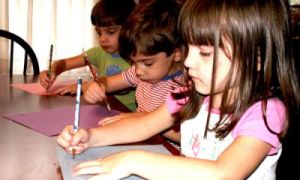

Early childhood teachers across Victoria are sounding the alarm over new childcare reforms, warning that the changes are piling administrative burdens onto staff and eroding the joy of teaching.
An early learning centre in Mandurah, Western Australia, has been left devastated after an alleged arson attack caused extensive damage estimated at $500,000.
Australia is home to the world’s oldest continuous cultures, with First Nations Peoples holding stories, knowledge, and connections to Country that stretch back more than 65,000 years. Now, educators and students can explore these stories in a new way through Deep Time, a digital resource created by the ABC Education team.
In a sector built on nurturing, empathy, and care, it’s heartbreaking to witness how often educators themselves are left feeling isolated, undervalued, or even bullied. On this World Kindness Day, let’s pause and remember: kindness isn’t just for children. It’s for us, too.
To Decision-Makers in Education and Care,
I write to you as an educator and advocate for the safety and well-being of children and staff in early childhood education.
A coalition of 55 early childhood experts has unveiled a bold six-point plan urging governments to take decisive action to restore public trust in Australia’s childcare system. Sparked by revelations from a year-long ABC investigation, the plan responds to widespread concerns about safety, quality, and transparency in early learning environments.
In a bold move to restore trust and transparency in early childhood education, the New South Wales Government has mandated that all ECEC services must publicly display their compliance and quality history within two weeks. This urgent directive follows a series of high-profile failures in the sector that have shaken public confidence and prompted calls for systemic reform.
The Australian Government Department of Education has engaged ORIMA Research to conduct an online ECEC Staff Survey. By collecting this data over time, the Department can get a better picture of the ECEC sector and how it is changing, including in relation to staff satisfaction with jobs, employment conditions, and workplace culture; staff well-being; staff views on the workings of the sector; and factors impacting attraction and retention in the ECEC sector.
A leading not-for-profit childcare provider has raised concerns about proposed safety regulations in the early childhood sector, cautioning that while well-intentioned, the new rules could have unintended consequences for both staff and families.
WARNING—DISTRESSING CONTENT: A chilling investigation by ABC’s Four Corners has uncovered how paedophiles are using the dark web to share detailed strategies for infiltrating childcare centers and abusing children, exposing a hidden crisis that experts say is far more organized and widespread than previously understood.
 As an Educator in Australia, your pay rate falls under the Children’s Services Award 2010. This award states the minimum amount that an employer can… Read More
As an Educator in Australia, your pay rate falls under the Children’s Services Award 2010. This award states the minimum amount that an employer can… Read More
 When working as a qualified Early Childhood Teacher (with a university degree) within a service, your rate of pay will come from the Educational Services… Read More
When working as a qualified Early Childhood Teacher (with a university degree) within a service, your rate of pay will come from the Educational Services… Read More
 When working as a Diploma Qualified Educator your pay rate is from the Children's Services Award 2010. This Award states your minimum rate of pay… Read More
When working as a Diploma Qualified Educator your pay rate is from the Children's Services Award 2010. This Award states your minimum rate of pay… Read More
 When working as a Cert 3 Qualified Educator, your pay rate is from the Children's Services Award 2010. This Award states your minimum rate of… Read More
When working as a Cert 3 Qualified Educator, your pay rate is from the Children's Services Award 2010. This Award states your minimum rate of… Read More
 Educational Leaders play a crucial role in their early childhood service by ensuring that the educational program aligns with best practices and supports the holistic… Read More
Educational Leaders play a crucial role in their early childhood service by ensuring that the educational program aligns with best practices and supports the holistic… Read More
 In early childhood education and care, ratios are more than a technicality—they are a frontline safeguard. Every child deserves responsive supervision, emotional connection, and developmental… Read More
In early childhood education and care, ratios are more than a technicality—they are a frontline safeguard. Every child deserves responsive supervision, emotional connection, and developmental… Read More
 Here’s a comprehensive Mobile Phone and Smart Watch Policy tailored for early childhood education and care (ECEC) services in Australia, aligned with the latest 2025… Read More
Here’s a comprehensive Mobile Phone and Smart Watch Policy tailored for early childhood education and care (ECEC) services in Australia, aligned with the latest 2025… Read More
 With the new national child safety reforms kicking in on 1 September 2025, early childhood services like yours have a real opportunity to lead the… Read More
With the new national child safety reforms kicking in on 1 September 2025, early childhood services like yours have a real opportunity to lead the… Read More
 The Sea of Fish Challenge is a national initiative that invites children, educators, families, and communities to create and display fish artworks as a symbol… Read More
The Sea of Fish Challenge is a national initiative that invites children, educators, families, and communities to create and display fish artworks as a symbol… Read More
 Across the early childhood education and care sector, educators are sounding the alarm: current staffing ratios are insufficient to deliver safe, meaningful, and developmentally appropriate… Read More
Across the early childhood education and care sector, educators are sounding the alarm: current staffing ratios are insufficient to deliver safe, meaningful, and developmentally appropriate… Read More

The “Preschool Room” is final step for you, as a childcare professional, to prepare your...
See more...
With National Science Week on from 9th to 17th August 2025, this is a great...
See more...
Cooking with toddlers in early childhood services can be a delightful and educational experience. It...
See more...© 2009-2025 Aussie Childcare Network Pty Ltd. All Rights Reserved.

